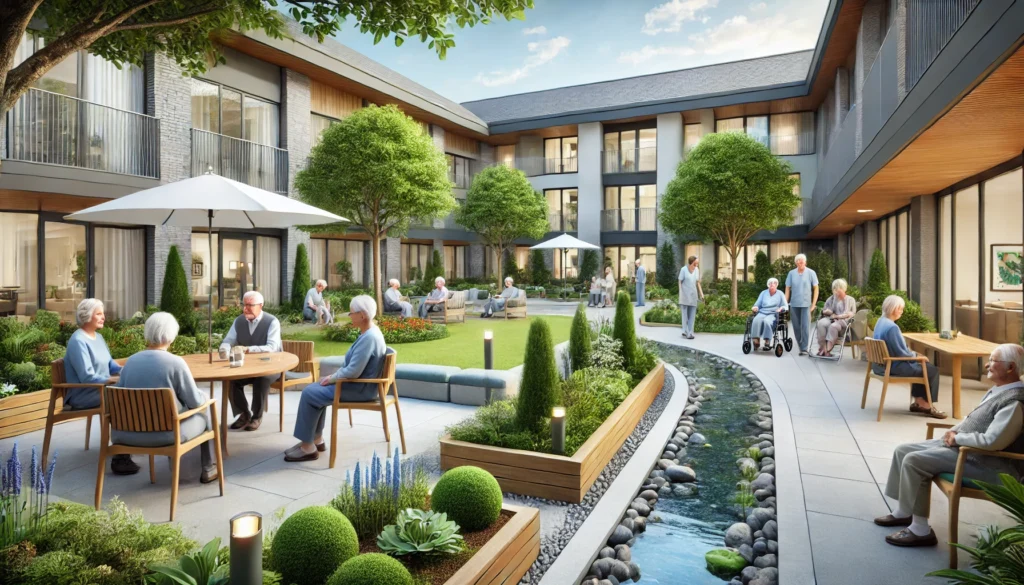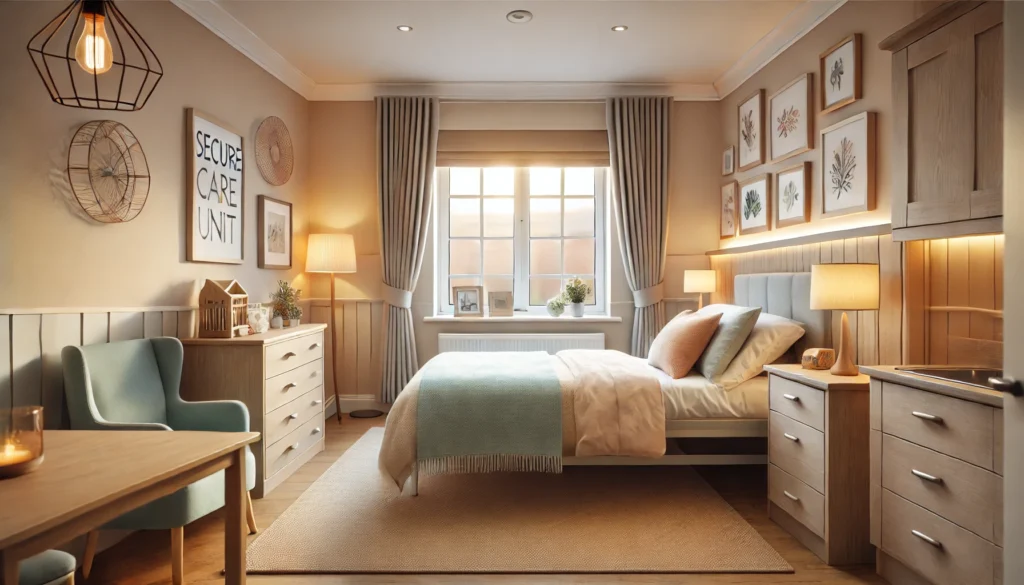Dementia units are specialized areas within nursing homes that cater specifically to individuals with cognitive impairments. These units are equipped with trained staff, tailored activities, and secured environments to ensure the safety and well-being of residents. The primary goal of dementia units is to provide a supportive and structured environment that enhances the quality of life for individuals with dementia.
You may also like: Finding Local Specialists for Memory Loss
Historical Context and Development
The concept of dementia care has evolved significantly over the years. In the early 20th century, individuals with dementia were often misunderstood and placed in general nursing homes where their unique needs were not addressed. As medical understanding progressed, it became evident that specialized care environments were necessary. This realization led to the development of dementia units, which focused on creating environments specifically tailored to individuals with cognitive impairments.
Over the decades, the approach to dementia care has shifted from a purely medical model to a more holistic approach. Early pioneers in dementia care recognized the importance of addressing psychological and social needs alongside medical care. This evolution has resulted in dementia units that prioritize a comprehensive approach to care, integrating medical treatment with emotional and social support.
Today, dementia units continue to adapt and improve, drawing on research and innovations in the field of gerontology. The development of dementia-specific training programs for staff and the integration of new therapeutic approaches are examples of how these units strive to meet the evolving needs of their residents.
The Importance of Specialized Care
Specialized care in dementia units is crucial for enhancing the quality of life for residents. Individuals with dementia have unique needs that require tailored approaches. For instance, understanding the progression of cognitive decline helps caregivers anticipate changes and adjust care plans accordingly. Specialized care involves not only addressing physical health but also focusing on psychological well-being, social interaction, and creating a sense of purpose.
Caregivers in dementia units are trained to recognize and manage behaviors associated with dementia, such as agitation and confusion. This specialized training enables staff to provide compassionate and effective care, reducing stress for both residents and their families. By creating a supportive environment that caters to the specific needs of individuals with dementia, these units foster a sense of security and enhance residents’ overall well-being.
The benefits of specialized care extend beyond individual residents. Families often experience relief knowing their loved ones are in an environment designed to meet their unique needs. This peace of mind allows family members to focus on maintaining meaningful connections with their loved ones, rather than worrying about their day-to-day care.
Current Trends in Dementia Care
Today’s dementia units are at the forefront of innovative care practices. From implementing cutting-edge technology to providing personalized care plans, these units are continuously adapting to meet the changing needs of residents. One notable trend is the emphasis on creating a home-like environment that promotes comfort and familiarity. This approach not only enhances the resident’s well-being but also fosters a sense of belonging and community.
Another trend is the integration of technology to support cognitive function and engagement. Many dementia units are utilizing virtual reality tools to provide immersive experiences that stimulate memory and cognitive function. These technologies offer residents opportunities to engage with familiar environments or explore new experiences, all while remaining in a safe and controlled setting.
Person-centered care is a core focus in modern dementia units. Care plans are increasingly customized to reflect the individual preferences and life histories of residents. This personalized approach ensures that care is not only effective but also meaningful, promoting dignity and autonomy for residents.

Key Features of Dementia Units
Dementia units offer a range of features designed to provide comprehensive care for residents. Understanding these features can help you make an informed decision when selecting a facility.
Specialized Staff and Training
The staff in dementia units are trained to understand the complexities of dementia and provide compassionate, individualized care. This includes not only medical and nursing care but also emotional support and behavioral management. Staff members receive ongoing training to stay updated on the latest dementia care practices, ensuring that residents receive the best possible care.
Training programs for staff often include modules on communication techniques, such as using non-verbal cues and active listening to connect with residents. These skills are crucial for building trust and understanding, particularly when verbal communication becomes challenging for individuals with dementia. Additionally, staff are trained in de-escalation techniques to manage challenging behaviors safely and respectfully.
Emotional support is a fundamental aspect of care in dementia units. Caregivers are trained to provide a nurturing environment that encourages residents to express their emotions and engage in meaningful activities. This support extends to families, with staff often facilitating family meetings to discuss care plans and provide updates on residents’ well-being.
Secure Environment
Safety is a top priority in dementia units. These units are designed with secured doors and monitored access to prevent wandering, a common behavior in individuals with dementia. Additionally, the layout of dementia units is often simple and intuitive, reducing confusion and promoting independence among residents.
Environmental design plays a significant role in ensuring safety and comfort. Dementia units often incorporate features such as color-coded hallways and clear signage to aid navigation. These design elements help residents maintain a sense of autonomy while minimizing the risk of disorientation.
Security measures are balanced with the need for residents to experience freedom and personal space. Many dementia units include secure outdoor areas where residents can enjoy fresh air and nature without the risk of wandering. These spaces provide opportunities for physical activity and relaxation, contributing to residents’ overall well-being.
Tailored Activities and Therapies
Engagement in meaningful activities is crucial for individuals with dementia. Dementia units offer a variety of therapeutic activities designed to stimulate cognitive function and promote social interaction. These activities range from music therapy and art classes to reminiscence therapy and sensory stimulation. By participating in these activities, residents can maintain their cognitive abilities and enhance their overall quality of life.
Therapeutic activities are often designed to be adaptable, allowing residents to participate at their own pace and comfort level. For instance, music therapy sessions may involve listening, singing, or playing instruments, providing multiple avenues for engagement. These activities not only stimulate cognitive function but also evoke positive emotions and memories.
Social interaction is a key component of daily life in dementia units. Group activities, such as gardening or cooking classes, encourage residents to connect with peers and build relationships. These interactions foster a sense of community and belonging, which are vital for emotional well-being.
How to Choose the Right Dementia Unit
Selecting the right dementia unit for your loved one is a significant decision. Here are some key factors to consider during your search:
Location and Accessibility
When searching for “dementia care facilities near me,” consider the proximity of the unit to family and friends. Frequent visits from loved ones can provide emotional support and improve the resident’s quality of life. Additionally, consider the accessibility of the facility for individuals with mobility challenges.
Proximity to family and friends is not only convenient but also essential for maintaining strong relationships. Regular visits allow family members to stay involved in their loved one’s care and provide emotional support. This connection can have a profound impact on the well-being of residents, offering comfort and familiarity in their daily lives.
Accessibility should also be a key consideration, particularly for residents with physical disabilities. Assess the facility’s layout, including wheelchair access and the availability of adaptive equipment. Ensuring the facility can accommodate mobility challenges will enhance your loved one’s comfort and ease of movement within the unit.
Quality of Care and Accreditation
Research the facility’s reputation and accreditation status. Accredited dementia units adhere to high standards of care and are regularly evaluated to ensure compliance with industry regulations. Look for facilities with positive reviews and testimonials from residents and their families.
Accreditation is a critical indicator of a facility’s commitment to quality care. Accredited units undergo rigorous assessments to ensure they meet or exceed industry standards. These evaluations cover various aspects of care, including staffing, safety, and resident satisfaction.
In addition to accreditation, consider the facility’s reputation within the community. Speak with other families who have loved ones in the unit and read online reviews to gain insights into their experiences. Positive testimonials from residents and families can provide reassurance that the facility delivers on its promises of quality care.
Personalized Care Plans
Evaluate whether the facility offers personalized care plans tailored to the individual needs of each resident. Personalized care plans should address not only medical needs but also emotional, social, and recreational needs. A facility that takes a holistic approach to care is more likely to provide a supportive and enriching environment for your loved one.
Personalized care plans are a hallmark of quality dementia care. These plans are developed in collaboration with residents, families, and healthcare professionals to ensure they reflect the unique needs and preferences of each individual. By prioritizing personalized care, dementia units can enhance residents’ quality of life and promote their dignity and autonomy.
Holistic care considers all aspects of a resident’s well-being, from physical health to emotional fulfillment. A well-rounded care plan will include activities and therapies that align with the resident’s interests and abilities, fostering a sense of purpose and joy. This approach not only supports the resident’s health but also contributes to their overall happiness and satisfaction.

Future Implications and Innovations
The field of dementia care is constantly evolving, with new innovations and research shaping the future of care. One exciting development is the use of technology to enhance care delivery. Virtual reality, for example, is being explored as a tool for cognitive stimulation and reminiscence therapy. Additionally, advancements in wearable technology are enabling more precise monitoring of residents’ health and behavior.
Technology is revolutionizing the way dementia care is delivered. Virtual reality experiences allow residents to engage with familiar environments or explore new ones, providing cognitive stimulation and a sense of adventure. These experiences can evoke memories and emotions, offering therapeutic benefits without leaving the safety of the dementia unit.
Wearable technology is another promising advancement in dementia care. Devices that monitor vital signs and activity levels provide caregivers with real-time data, enabling more responsive and personalized care. These technologies enhance caregivers’ ability to anticipate residents’ needs and tailor interventions accordingly.
As research continues to uncover new insights into dementia, the potential for innovative care solutions grows. Scientists and healthcare professionals are exploring novel approaches to treatment, such as personalized medicine and targeted therapies. By staying informed about these developments, caregivers and families can make well-informed decisions that benefit their loved ones.

Conclusion
Dementia units play a crucial role in providing specialized care for individuals with cognitive impairments. By understanding the features and benefits of these units, as well as the considerations for selecting the right facility, you can make an informed decision that supports the well-being of your loved one. As the landscape of dementia care continues to evolve, staying informed and engaged will ensure that your loved one receives the highest quality of care possible.
Remember, the journey of finding the right care for a loved one with dementia is deeply personal and requires careful consideration. By prioritizing the unique needs and preferences of your loved one, you can find a dementia unit that feels like home.
Choosing a dementia unit is not just about finding a place for care; it’s about finding a community that will embrace your loved one with compassion and respect. This decision will impact their quality of life and your peace of mind, making it essential to approach the process with diligence and empathy.
Ultimately, the goal is to provide a nurturing environment where your loved one can thrive, surrounded by caregivers who understand their needs and are dedicated to their well-being. By focusing on the individual and the community, you can create a positive and fulfilling experience for your loved one and yourself.
Further Reading:
Specialized dementia care in nursing homes linked to better outcomes for residents
Nursing Homes with Dementia Special Care Units Provide Better Quality of Care
Important Note: The information contained in this article is for general informational purposes only, and should not be construed as health or medical advice, nor is it intended to diagnose, prevent, treat, or cure any disease or health condition. Before embarking on any diet, fitness regimen, or program of nutritional supplementation, it is advisable to consult your healthcare professional in order to determine its safety and probable efficacy in terms of your individual state of health.
Regarding Nutritional Supplements Or Other Non-Prescription Health Products: If any nutritional supplements or other non-prescription health products are mentioned in the foregoing article, any claims or statements made about them have not been evaluated by the U.S. Food and Drug Administration, and such nutritional supplements or other health products are not intended to diagnose, treat, cure, or prevent any disease.


